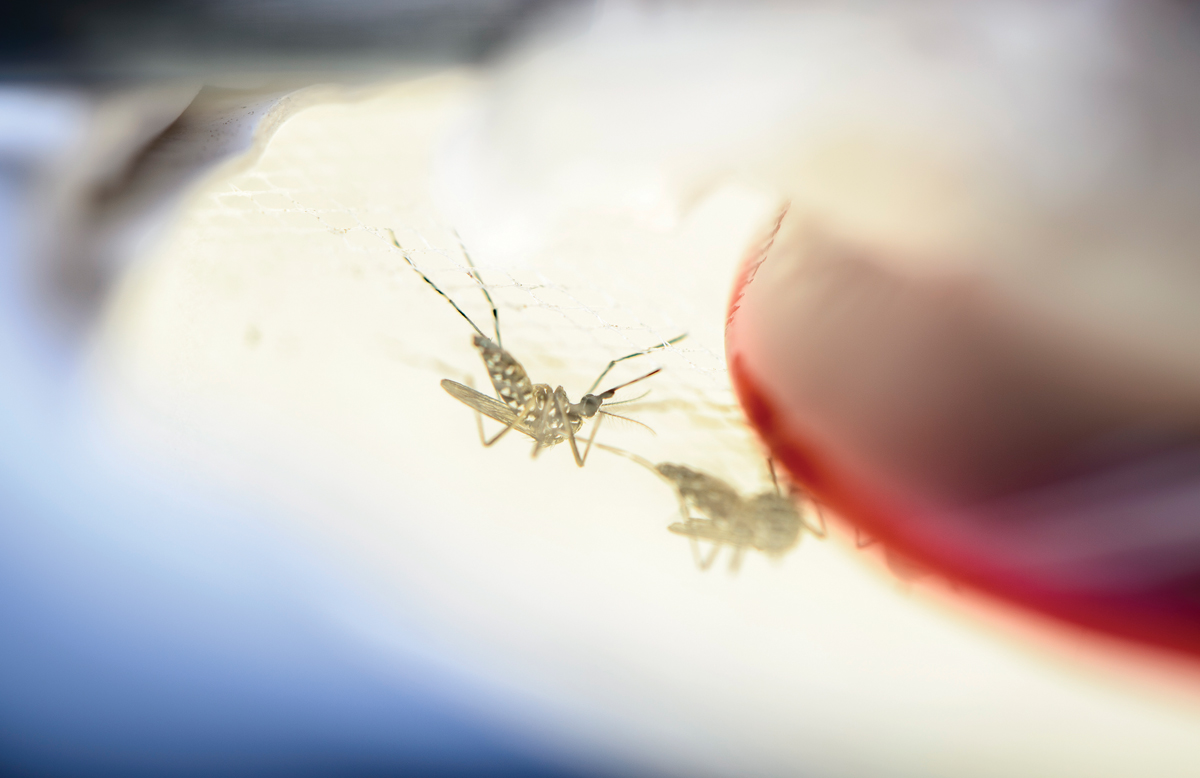Natural Selections
A MosAIC of Microbiomes
CALS scientists have helped create a publicly available database of mosquito gut bacteria that could unveil ways to stop the diseases they carry.

Vector-borne diseases account for more than 17% of all infectious diseases and cause more than 700,000 deaths annually, according to the World Health Organization. Diseases transmitted by mosquitoes are a major global health issue and include malaria, dengue fever, and serious birth defects caused by the Zika virus. The effects of climate change could increase the spread of these and other mosquito-borne diseases by expanding the geographical range of habitats suitable for mosquitoes.
To better understand the spread of these diseases, researchers from UW–Madison and the United Kingdom have joined forces to create a bacterial Mosquito-Associated Isolate Collection (MosAIC), the first large-scale repository of mosquito-associated microbiomes. The collection, which is freely available to educators and researchers, includes genome data and 392 bacterial isolates that could reveal how different bacteria in the microbiome affect their mosquito hosts, including their ability to spread human pathogens.
Insect microbiomes, which impact how well they can transmit human pathogens, are still poorly understood. The composition of the mosquito microbiome is dynamic and affected by host species, geography, and life stage. As resistance to insecticides among mosquitoes increases, microbiome manipulation stands out as a promising alternative for future disease control measures.
“Despite extensive research on mosquitoes, our understanding of the bacteria in their microbiomes and the roles these bacteria play remains limited,” says Kerri Coon, assistant professor of bacteriology at CALS and leader of project efforts at UW. “To uncover the complexities of these interactions and their impacts on mosquito biology and disease transmission, we need genome information as well as physical isolates of the same bacteria that can be studied in the lab. MosAIC marks the first time that these paired resources will be available.”
The MosAIC project was co-led by researchers from UW and Liverpool School of Tropical Medicine, and a paper outlining the work was published in November 2024 in the journal PLOS Biology. The collection was generated using material supplied by more than 50 individuals across the globe, including 44 undergraduate students enrolled in a capstone microbiology course in the Department of Bacteriology during the spring 2022 semester.
“When you create a resource like this for the scientific community, you’re providing the raw material for creativity and innovation,” adds Holly Nichols, a graduate student in microbiology who works in Coon’s lab. “We look forward to seeing how researchers will incorporate these bacteria into their own work. As we grow the collection, I am reminded that each new isolate could hold the key to ending malaria or dengue transmission.”
The collection is administered out of Coon’s lab. Future expansions are planned and will continue to be led by Coon, with support from additional collaborators in Central and South America, Africa, South and Southeast Asia, and the Pacific. Additional cohorts of students will also be involved with supplemental funding support through the National Science Foundation’s STEM Access for Persons with Disabilities (STEM-APWD) program.
“I never could have imagined how this project would evolve into something that would so beautifully integrate my lab’s research and teaching missions, all the while supporting my goal to improve student access to authentic research experiences, especially students underrepresented in STEM fields,” Coon says. “I have big plans for this research moving forward. We’re even lining up partners to facilitate training opportunities for students from disease endemic countries at UW–Madison and vice versa.”
Federally Supported Research
This project has been primarily funded by the U.S. National Science Foundation, with additional support from the Biotechnology and Biological Sciences Research Council, part of UK Research and Innovation.
This article was posted in Basic Science, Changing Climate, Health and Wellness, Natural Selections, Summer 2025 and tagged Bacteriology, dengue fever, disease, gut bacteria, Kerri Coon, malaria, Microbiome, mosquitos, vectors, World Health Organization, Zika virus.

